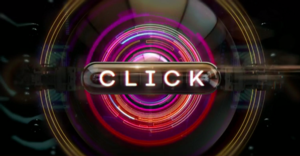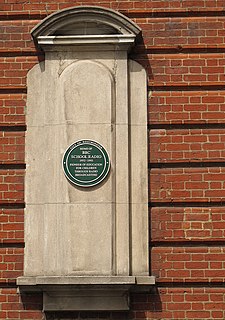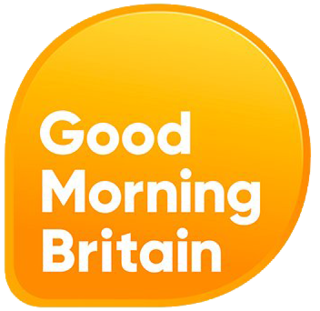Click (previously known as Digital Planet and Go Digital) is a radio programme broadcast on the BBC World Service. A sister programme of the same name is broadcast on BBC News and BBC World News television.
The original inventors of radio, from Guglielmo Marconi's time on, expected it to be used for one-on-one wireless communication tasks where telephones and telegraphs could not be used because of the problems involved in stringing copper wires from one point to another, such as in ship-to-shore communications. Those inventors had no expectations whatever that radio would become a major mass media entertainment and information medium earning many millions of dollars in revenues annually through radio advertising commercials or sponsorship. These latter uses were brought about after 1920 by business entrepreneurs such as David Sarnoff, who created the National Broadcasting Company (NBC), and William S. Paley, who built Columbia Broadcasting System (CBS). These broadcasting business organizations began to be called network affiliates, because they consisted of loose chains of individual stations located in various cities, all transmitting the standard overall-system supplied fare, often at synchronized agreed-upon times. Some of these radio network stations were owned and operated by the networks, while others were independent radio owned by entrepreneurs allied with the respective networks. By selling blocks of time to advertisers, the medium was able to quickly become profitable and offer its products to listeners for free, provided they invested in a radio receiver set.

The BBC World Service, the world's largest international broadcaster, broadcasts radio and television news, speech and discussions in more than 40 languages to many parts of the world on analogue and digital shortwave platforms, Internet streaming, podcasting, satellite, DAB, FM and MW relays. In November 2016 the BBC announced again that it would start broadcasting in additional languages including Amharic and Igbo, in its biggest expansion since the 1940s. In 2015 World Service reached an average of 210 million people a week. The English-language service broadcasts 24 hours a day.

BBC World News is the BBC's international news and current affairs television channel. It has the largest audience of any channel, with an estimated 99 million viewers weekly in 2015/16, part of the estimated 265 million users of the BBC's four main international news services. Launched on 11 March 1991 as BBC World Service Television outside Europe, its name was changed to BBC World on 16 January 1995 and to BBC World News on 21 April 2008.The service is aimed at the overseas market, similar to DD India, WION, DW, France 24 and RT. It broadcasts news bulletins, documentaries, lifestyle programmes and interview shows.Unlike the BBC's domestic channels, BBC World News is owned and operated by BBC Global News Ltd., part of the BBC's commercial group of companies, and is funded by subscription and advertising revenues, and not by the United Kingdom television licence. It is not owned by BBC Studios.
The show is presented by Gareth Mitchell. On alternate weeks either Bill Thompson or Ghislaine Boddington comment on items in the programme and discuss them with Gareth. The show, broadcast weekly, covers technology stories and news from around the world. [1]

Gareth Mitchell is a Welsh technology journalist, lecturer and former broadcast engineer.

William George Thompson is an English technology writer, best known for his weekly column in the Technology section of BBC News Online and his appearances on Click, a radio show on the BBC World Service. He is also an Honorary Senior Visiting Fellow at City University London's Journalism Department. and writes for BBC Webwise.
Ghislaine Boddington is a British artist, curator, presenter and director specialising in body responsive technologies and immersive experiences, pioneering it as 'hyper-enhancement of the senses' and 'hyper-embodiment' since the late 80s. Coming from a performing arts background, she has focused on the blending of the virtual and physical body through converging telepresence, sensors, motion capture, wearables, gesture interfaces, biofeedback, robotics, virtual worlds and mixed realities into experiential environments.
From 2001-2004, it was presented by Tracey Logan and during that time it was one of the BBC's few webcast programmes, with cameras providing a live feed.

A webcast is a media presentation distributed over the Internet using streaming media technology to distribute a single content source to many simultaneous listeners/viewers. A webcast may either be distributed live or on demand. Essentially, webcasting is "broadcasting" over the Internet.
The show was renamed Click on 29 March 2011 to make it easier to recognise its status as a sister programme of TV programme Click, which is broadcast on BBC News Channel and BBC World News. The show's running time was reduced from 28 minutes to 18 minutes. The first broadcast each week is also live, whereas previously it was recorded. [2] The show is now around 27 minutes long.

Click is a weekly BBC television programme covering news and recent developments in the world of consumer technology, presented by Spencer Kelly.
Click covers a wide range of issues affecting technology. Often there are segments on technological solutions to problems facing charitable or humanitarian causes, with a speaker representing the cause being interviewed by Gareth Mitchell. One example is the segment on a screen saver which harnessed the power of idling home PCs to help perform complex mathematical calculations to help cure malaria.

A personal computer (PC) is a multi-purpose computer whose size, capabilities, and price make it feasible for individual use. Personal computers are intended to be operated directly by an end user, rather than by a computer expert or technician. Unlike large costly minicomputer and mainframes, time-sharing by many people at the same time is not used with personal computers.
A cure is a substance or procedure that ends a medical condition, such as a medication, a surgical operation, a change in lifestyle or even a philosophical mindset that helps end a person's sufferings; or the state of being healed, or cured.

Malaria is a mosquito-borne infectious disease that affects humans and other animals. Malaria causes symptoms that typically include fever, tiredness, vomiting, and headaches. In severe cases it can cause yellow skin, seizures, coma, or death. Symptoms usually begin ten to fifteen days after being bitten by an infected mosquito. If not properly treated, people may have recurrences of the disease months later. In those who have recently survived an infection, reinfection usually causes milder symptoms. This partial resistance disappears over months to years if the person has no continuing exposure to malaria.
Other topics covered have included:

Technology is the collection of techniques, skills, methods, and processes used in the production of goods or services or in the accomplishment of objectives, such as scientific investigation. Technology can be the knowledge of techniques, processes, and the like, or it can be embedded in machines to allow for operation without detailed knowledge of their workings. Systems applying technology by taking an input, changing it according to the system's use, and then producing an outcome are referred to as technology systems or technological systems.

Smartphones are a class of mobile phones and of multi-purpose mobile computing devices. They are distinguished from feature phones by their stronger hardware capabilities and extensive mobile operating systems, which facilitate wider software, internet, and multimedia functionality, alongside core phone functions such as voice calls and text messaging. Smartphones typically include various sensors that can be leveraged by their software, such as a magnetometer, proximity sensors, barometer, gyroscope and accelerometer, and support wireless communications protocols such as Bluetooth, Wi-Fi, and satellite navigation.

HD DVD is a discontinued high-density optical disc format for storing data and playback of high-definition video. Supported principally by Toshiba, HD DVD was envisioned to be the successor to the standard DVD format.
Usually views sent either by e-mail, Facebook, Twitter or using the BBC News website are read out and discussed briefly by the hosts.
A special pre- and post show session for podcast listeners is produced which cannot be heard by those listening to broadcast radio. The fan club's Prezzi created a special picture for the show, which was framed, delivered and discussed on line, and held a Google Hangout during the show where listeners discussed the show in real time, and engaged with the presenters - see Bill Thompson engaging with the Hangout on Air. Gareth and Bill were interviewed for the Project Kazimierz Podcast in 2015 here

BBC Radio 4 is a radio station owned and operated by the British Broadcasting Corporation (BBC) that broadcasts a wide variety of spoken-word programmes including news, drama, comedy, science and history. It replaced the BBC Home Service in 1967. The station controller is Gwyneth Williams, and the station is part of BBC Radio and the BBC Radio department. The station is broadcast from the BBC's headquarters at Broadcasting House, London. On 21 January 2019 Williams announced she was quitting the role. There are no details of when or who will be her replacement.

BBC Radio 4 Extra is a British digital radio station broadcasting archived repeats of comedy, drama and documentary programmes nationally, 24 hours a day. It is the principal broadcaster of the BBC's spoken-word archive, and as a result the majority of its programming originates from that archive. It also broadcasts extended and companion programmes to those broadcast on sister station BBC Radio 4, and provides a "catch-up" service for certain Radio 4 programmes.

LBC is a London-based national phone-in and talk radio station. It was the UK's first licensed commercial radio station, beginning broadcasting on Monday 8 October 1973, a week ahead of Capital Radio. The launch of LBC also saw the beginning of IRN's broadcasting, as LBC provided the service to independent local radio stations nationwide.

Richard Paul Bacon is an English television and radio presenter. He was a host of the children's show Blue Peter—his first high-profile media role—until he was fired in 1998 after 18 months for admitting to taking cocaine. He has since worked as a reporter or presenter on numerous television shows, including The Big Breakfast, and on radio stations including Capital FM, Xfm London and BBC Radio Five Live. In 2016 Bacon became the presenter of The National Geographic Channel's reboot of its documentary/panel discussion TV series, Explorer.
The Chris Moyles Show is the title given to two differing versions of a radio programme hosted by Chris Moyles, originally broadcast as The Radio 1 Breakfast Show from 5 January 2004 to 14 September 2012 before transferring three years later in September 2015 to the Global Radio-owned commercial radio station Radio X. The show is broadcast 6:30–10:00am each weekday.
Scott Mills is a Sony Radio Academy Award-winning radio show, broadcast Monday - Thursday afternoons on BBC Radio 1 from 1–4 pm. On Fridays, Mills hosts The Official Chart and Radio 1's Dance Anthems from 4-7pm. The show originally aired from 4–7 pm from 7 June 2004 until 30 March 2012. It is hosted by Scott Mills, with contributions from Chris Stark. Previous contributors have included Mark Chapman, Laura Sayers, and Beccy Huxtable, the last of whom left the show on 18 January 2013.
Up All Night is a news and phone-in programme broadcast on the national news/sport station BBC Radio 5 Live in the United Kingdom, and is on air between 1 and 5 am every night. It is also broadcast on most of the BBC's local radio frequencies across England as well as on Radio Scotland, Radio Cymru and Radio Ulster.
Newsbeat is the flagship news programme on BBC Radio 1 and BBC Radio 1Xtra. Newsbeat is produced by BBC News but differs from the BBC's other news programmes in its remit to provide news tailored for a specifically younger audience.
You and Yours is a British radio consumer affairs programme, broadcast on BBC Radio 4.

The Russell Brand Show is a radio show first broadcast in 2006 on BBC Radio 6 Music. The show's host is English comedian Russell Brand, who is usually joined his by co-host and long-term friend, Matt Morgan, as well as the show's poet laureate, Greg "Mr Gee" Sekweyama. The show has also featured regular contributions from English musician Noel Gallagher, who has been described as an unofficial co-host.
Money Box is a weekly personal finance radio programme on BBC Radio 4.

World Have Your Say (WHYS) was an international BBC global discussion show, which was broadcast on BBC World Service every weekday at 1600 hours UTC and on BBC World News every Friday at 1500 hours UTC.

Geoff Lloyd with Annabel Port was a drivetime radio programme, broadcast on Absolute Radio.

BBC School Radio is a division of the BBC providing audio learning resources for primary schools in the United Kingdom.

Kermode and Mayo's Film Review is a radio programme with Mark Kermode and Simon Mayo, broadcast regularly on BBC Radio 5 Live on Friday afternoons between 2 pm and 4 pm. The show is self-described as the BBC's "flagship film programme", and features film reviews from Kermode, interviews with actors and other guests, and listeners' emails. The programme's Twitter handle, "Wittertainment", is a nickname for the programme itself.
Breakfast with Hector was a breakfast radio programme on RTÉ 2fm in Ireland, presented by Hector Ó hEochagáin from 4 October 2010. It was broadcast at 7:00–9:00 am each weekday from Galway. It was confirmed on 18 December 2013 that Ó hEochagáin would be leaving the show and returning to TV work. The last show was broadcast on Friday, 20 December 2013. The last show ended with I Still Haven't Found What I'm Looking For by U2.

Dan and Phil was a British radio show hosted on BBC Radio 1 on Sunday evening, by presenters Dan Howell and Phil Lester, who are most commonly known as Dan and Phil. The show was a spiritual successor to the original Request Show on the station, allowing listeners to request songs to be played but also encompassing additional entertainment features. It was loosely based on Dan and Phil's now discontinued internet series, The Super Amazing Project, which included segments such as Internet News.

Good Morning Britain is a breakfast programme on British television network ITV Breakfast, usually broadcast on weekdays from 6.00 am to 8.30 am on ITV. The show launched on 28 April 2014 after Daybreak was cancelled. As of autumn 2017, Good Morning Britain has around 700,000 viewers daily.






















